Iran Targets Luxury Home Tax Amid Budget Deficit
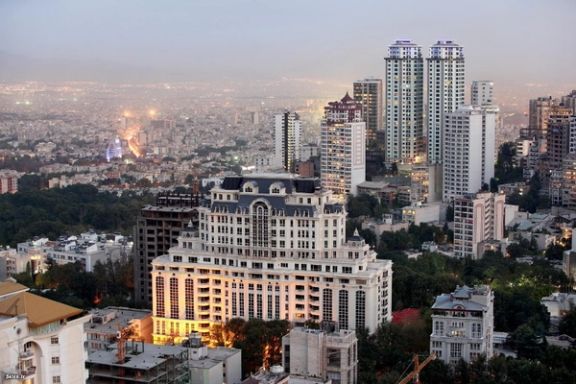
In an effort to bolster revenue, the Iranian government has identified 110,000 luxury homes to tax, cracking down on the country's affluent homeowners.

In an effort to bolster revenue, the Iranian government has identified 110,000 luxury homes to tax, cracking down on the country's affluent homeowners.
According to the annual tax law, properties exceeding 400,000 USD value face a two per thousand tax on the excess value, with municipalities mandated to report property status to the Tax Affairs Organization.
Notably, residential units and villas under construction are exempt from this tax, and in cases of ownership transfer, the luxury home tax responsibility falls on the original owner starting from the Iranian New Year on March 21.
The government claims the objective in taxing vacant luxury homes is to discourage owners, not dependent on them for income, from keeping these properties empty to demand rents or sale prices higher than market values.
However, the move has sparked criticism, with some attributing it to the government's financial constraints due to sanctions and low oil revenues. Critics argue that the government is resorting to extracting more money from citizens, as they face a large budget deficit.
The amount of the Iranian government debts has increased about 900-fold over the past decade to $60 billion. This would be as much as 850 million barrels, or two years’ worth of oil exports at normal market prices.
Iran's economy, where 80% is directly or indirectly controlled by the government or semi-official entities, has faced challenges despite a privatization drive initiated 15 years ago. The effort has, in some cases, resulted in the creation of quasi-governmental firms controlled by influential figures, limiting competition and relying on public funds to sustain operations.

Two Iranian tourism professionals have been arrested in Esfahan province for “violating hijab regulations.”
Niloufar Ghazaleh and her husband, Mohammad Ali Moghimi, were taken into custody on Monday under the orders of the judge of Khur and Biabanak county court.
Approximately a month ago, Ghazaleh had received a five-year imprisonment sentence for what authorities termed "publishing photos without hijab." The couple's guest house has been sealed for over a month under the same judge's directive.
Reports indicate that numerous tourist accommodations in the city of Khur, recognized as the Mesr Tourism Zone, have been shut down in recent months, ostensibly due to visitors not adhering to hijab.
Local witnesses suggest that, following the judge's order, law enforcement has closed down all previously thriving tourism-related businesses in the area.
Activities such as entering tourist sites without permission, conducting body inspections by undressing tourists, and scrutinizing the contents of tourists' mobile phones are among the measures carried out by the police in the region.
In September, Esmail Barat, Deputy for Supervision and Evaluation of Tourism Services in the country, revealed that, over the past year, 77 tourism units nationwide, including hotels, eco-lodges, traditional restaurants, and roadside centers, have been sealed due to "failure to observe norms and hijab."
Moreover, in July, disturbing images and news emerged of an attack by approximately 30 IRGC forces in uniforms and military vehicles on tourists residing in tents in the mountainous region of Opart, bordering Semnan and Mazandaran. The victims were reportedly subjected to beatings with batons and shockers.
A few days after the incident, the news website Rouydad 24 reported that the spokesperson for the Semnan governorate insisted that the Islamic Revolutionary Guard Corps should be held accountable for the assault.
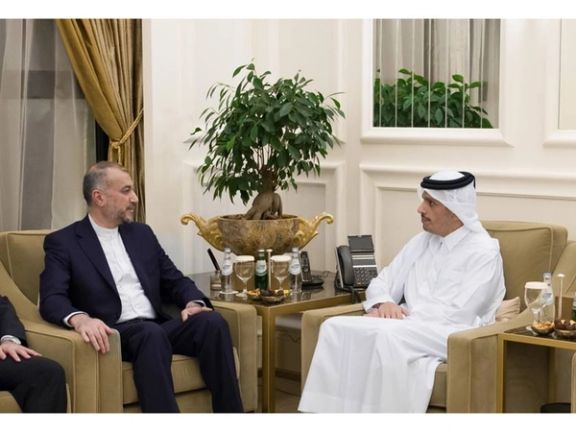
Iran received many messages from the United States in the past six weeks of regional conflict, foreign minister Hossein Amir-Abdollahian told Qatar’s Al Jazeera television.
“Americans always emphasized in their messages that they are not after expanding the war. We responded that although you say you are not after expanding the war, but by standing with the Israeli regime and supplying large quantities of weapons and equipment from American bases in the region, you have practically expanded the conflict,” Amir-Abdollahian said. The messages were delivered through the Swiss embassy in Tehran, he said.
The United States deployed two powerful naval strike groups to the region soon after Israel began its attacks on Gaza, after Hamas’ terror attack on October 7. They deployment was seen as deterrence to Iran and its most powerful proxy force, the Lebanese Hezbollah.
Iran avoided direct military involvement in the Gaza war, but its proxy forces launched attacks against US bases in the region and against Israel.
Amir-Abdollahian referred to these attacks in his interview, as “the natural reaction of resistance forces in the region.” He then went on arguing that militant groups in Iraq, Lebanon and elsewhere in the region are genuine anti-US and anti-Israeli popular forces, failing to mention that Iran’s Revolutionary Guard spent vast sums of money to create these groups and support them.
Although the US retaliated several times against the more than 70 attacks on US forces in past weeks, critics argue that deterrence against Iran has failed and Washington needs to target the Revolutionary Guard directly to prevent more attacks.
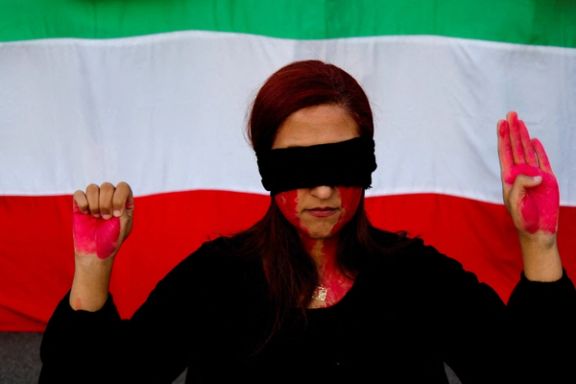
On the International Day for the Elimination of Violence against Women, civil society groups emphasized that serious violations in Iran is deeply ingrained and systematic.
The Women's Revolution, a coalition of rights activists advocating for social and economic equality, modernism, and the separation of religion and state, highlighted the roots of women's rights violations in the laws and governance of the Islamic Republic.
These violations include granting men the right to divorce and child custody, obliging women to provide marital relations on demand, endorsing child marriage, imposing death sentences on women for extramarital relationships, idealizing traditional gender roles, restricting women's entry to stadiums, and imposing limitations on their education and professions.
“We, the signatories of this statement, know very well that women will never be freed from violence and this cycle of sexism will continue given the domination of a gender apartheid system. But we believe that the Woman, Life, Freedom revolution has sparked the hope in everyone's hearts that the end of this tragedy is conceivable,” the statement said.
In a statement which it published on Facebook, the banned Iranian Writers’ Association (Kanoon-e Nevisandegan-e Iran), also said violation of women’s rights in the Islamic Republic is “systematic”.
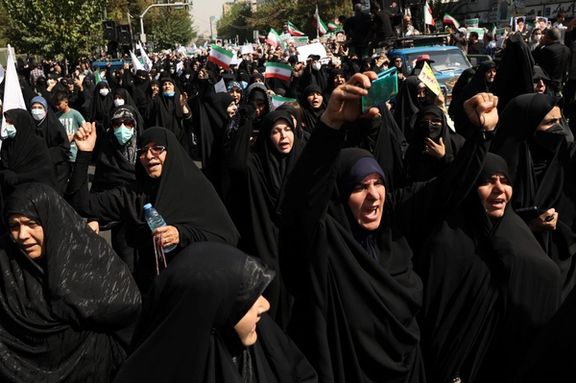
The Writers’ Association said in their statement that imposing hijab on Iranian women by the Islamic government after the 1979 revolution was a first step that was quickly followed to embrace many other areas of their lives including laws, family, work, and education. These, the statement said, revealed themselves in deepening of women’s oppression and revealed themselves as domestic violence, child marriage, and honor killings, and other forms of violence such as acid attacks.
“This misogyny revealed its ultimate barbarism against the movement that began with the Woman, Life, Freedom slogan,” the statement said and warned that the “dominance of reactionary cultural and religious elements” has elevated violence against women and their oppression to “disastrous new dimensions”.
Many allege that the Islamic Republic has given free rein to reactionary religious groups for violence against women such as mass poisoning of female students that began in November last year and continued for several months.
Authorities denied any responsibility or involvement in the attacks that affected hundreds of schools and thousands of girls across the country for months but did not take action to find and arrest those behind the attacks.
Authorities have also stepped-up pressure on women’s rights activists who are increasingly being arrested on various pretexts and heavily sentenced in unfair trials to silence them. Women’s rights activists are also increasingly being subjected to violence in prisons.
In a letter from Evin Prison in August, Narges Mohammadi who won the Nobel Peace Prize in November warned about escalating systematic violence against female prisoners and revealed disturbing details of physical harassment, abuse, and assault inflicted on women inmates in the months leading up to the anniversary of the nationwide Woman, Life, Freedom protests.
In a resolution adopted Thursday, the European Parliament strongly condemned the latest attacks against women, girls, and women's rights defenders in Iran and called on the Iranian leadership to immediately stop the systemic oppression and all discrimination against women and girls, including mandatory veiling, and to withdraw all gender discriminatory laws.
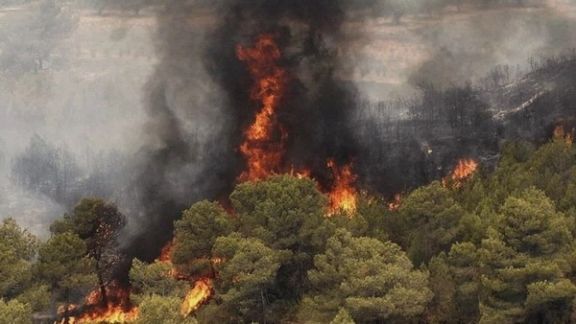
Fires that ignited in the Hyrcanian forests in northern Iran on Thursday have persisted for the fifth consecutive day, posing a severe threat to the ecologically significant region.
Despite initial containment efforts, the situation escalated on Monday morning due to strong gusts of warm wind, rekindling the flames.
Reports indicate that since Friday morning, three locations in the Mazandaran province, specifically in the cities of Tonekabon, Noshahr, and Savadkouh, have been impacted by the wildfires.
Meteorological forecasts warn of continued warm wind gusts and rising temperatures on Tuesday and Wednesday, heightening the likelihood of fresh outbreaks in other parts of the Mazandaran forests in the coming days.
Mehrdad Khazaipoul, the Director General of Natural Resources and Watershed Management of Mazandaran in Noshahr, identified the "negligence of illegal hunters and excavators in extinguishing the fire" as the primary cause of the wildfire.
Esmaeil Sadeghi Niyarki, the Chief Justice of Gilan province, reported on Monday about wildfires in the forests of the neighboring province. The fire, which started on Saturday afternoon in the protected forests of Shaft, has now spread across 11 counties, covering an extensive area of 53 hectares.
This isn't the first time the Hyrcanian forests have experienced such devastation. In December 2022, a wildfire engulfed 40 hectares of the ancient forests, emphasizing the persistent threat to the natural heritage.
The Hyrcanian forests, with a history dating back 40 million years, are among the world's most valuable. Designated as the second natural heritage of Iran on the UNESCO World Heritage List in July 2019, the forests house 90 species of trees.
Experts emphasize that the lack of modern firefighting equipment in the country's forests exacerbates the situation. Traditional tools like shovels, pickaxes, and fire beaters are often employed for firefighting efforts.
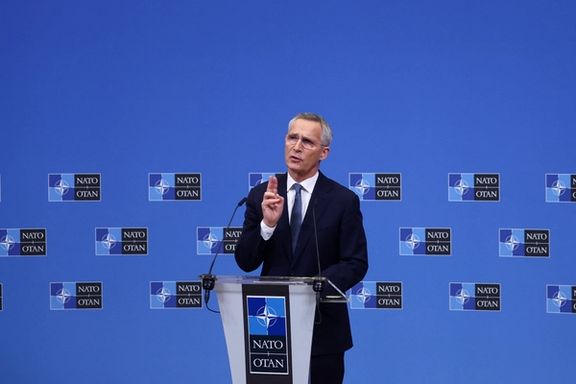
NATO Secretary-General Jens Stoltenberg has urged Iran “to rein in its proxies”, as groups across the region continue to raise tensions in the wake of the Gaza war.
Citing the alliance between Iran, Syria, Hezbollah in Lebanon, and Hamas, Stoltenberg expressed deep concern regarding recent drone attacks targeting ships, US forces, and assaults on commercial vessels in the region. He stressed the critical importance of Iran preventing the conflict from escalating into a full-scale regional war.
It comes on the back of the war in Gaza which began on October 7 when Hamas invaded Israel, murdering 1,200 mostly civilians and taking 240 or more hostage in the most deadly single day since the Holocaust.
In a press conference on Monday, Stoltenberg supported extending the four-day truce between Israel and Hamas, emphasizing the necessity of getting aid into the besieged strip and supporting the release of additional hostages. On Monday night, two more days were agreed by both sides.
Proxies in Lebanon, Syria, Yemen and Iraq have all been activated since the war broke out. Beyond missile and drone attacks, recent weeks have also witnessed Houthi rebels in Yemen attempting attacks on Israeli ships.
Over 60 attacks on US facilities in Syria and Iraq have also taken place since the war as Iran's shadow war steps up its pace.
On Sunday, Houthi rebels, supported by the Islamic Republic, made a seizure attempt on the Liberian-flagged oil tanker Central Park, managed by Zodiac Maritime, in the Gulf of Aden. The Yemeni government, recognized by the United Nations, accused the Houthis of orchestrating the hijacking.
The US military's Central Command released a statement on Monday, confirming that its forces, including the Arleigh Burke-class destroyer USS Mason, responded promptly to the tanker seizure. The statement highlighted that missiles launched by the Houthis landed approximately 10 nautical miles from the ships, resulting in no reported damage or injuries during the incident.